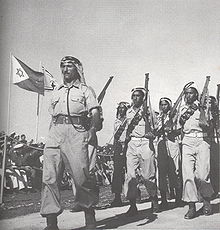Bedouins

Negev Bedouins, a Muslim minority which includes about 12% of Israeli Arabs, tend to identify more as Israelis than other Arab citizens of Israel. Many Negev Bedouins serve in the Israel Defense Forces. Each year, between 5%-10% of the Bedouin of draft age volunteer for the Israeli army, (unlike Druze, and Jewish Israelis, they are not required by law to do so).
Bedouins had long standing ties with nearby Jewish communities. Bedouins of Tuba-Zangariyye helped defend these communities in the 1936–1939 Arab revolt in Palestine. Formal co-operation between Jews and Bedouin began in 1946, when tribal leader Sheik Hussein Mohammed Ali Abu Yussef of the al-Heib tribe sent more than 60 of his men to fight alongside Zionist forces, forming the Pal-Heib unit of the Haganah. During the 1948 Arab-Israeli War, the Pal-Heib unit defended Jewish communities in the Upper Galilee against Syria. Sheik Abu Yussef was quoted in 1948 as saying, "Is it not written in the Koran that the ties of neighbors are as dear as those of relations? Our friendship with the Jews goes back many years. We felt we could trust them and they learned from us too".
Maj Fehd Fallah, a Bedouin from the village of Saad in the Israeli occupied Golan Heights said in an interview: "Yes, I have fought against Muslims in Gaza," he says. "And I would fight again if I had to," he added. "Israeli Muslims who don't serve in the IDF should be ashamed for not serving their country."

Bedouin IDF soldiers of Rumat al-Heib (عرب الهيب)
during a military parade in Tel-Aviv in June 1949.
Ismail Khaldi is the first Bedouin deputy consul of the State of Israel and the highest ranking Muslim in the Israeli foreign service. Khaldi is a strong advocate of Israel. While acknowledging that the state of Israeli Bedouin minority is not ideal, he said
I am a proud Israeli - along with many other non-Jewish Israelis such as Druze, Bahai, Bedouin, Christians and Muslims, who live in one of the most culturally diversified societies and the only true democracy in the Middle East. Like America, Israeli society is far from perfect, but let us deals honestly. By any yardstick you choose -- educational opportunity, economic development, women and gay's rights, freedom of speech and assembly, legislative representation -- Israel's minorities fare far better than any other country in the Middle East.
Druze and Circassian Muslims
The Circassians in Israel are non Arab, predominantly Sunni Muslims. The Circassians have had a good relations with the Jewish community in Israel since the beginning of the Jewish settlement in the Land of Israel. The Circassians community in Israel helped the illegal immigration (Ha'apala) of Jews into Palestine During the British Mandate and fought on the Israeli side of the War of Independence. Like the Druze population, since 1958 male Circassians perform Israeli mandatory military service upon reaching the age of majority, while females are not. Many Circassians in Israel are employed in the security forces, including in the Border Guard, the Israel Defence Forces, the police and the Israel Prison Service. The percentage of the army recruits among the Circassian community in Israel is particularly high.
The Druze are a religious community found who consider themselves an Islamic Unist, reformatory sect. The Druze mostly do not identify with the cause of Arab nationalism. The bond between the Jewish and Druze is commonly known by the term "a covenant of blood". Druze citizens are prominent in the Israel Defense Forces and in politics. A considerable number of Israeli Druze soldiers have fallen in Israel's wars since the 1948 Arab-Israeli War. Five Druze lawmakers currently have been elected to serve in the 18th Knesset, a disproportionately large number considering their population. Reda Mansour a Druze poet, historian and diplomat, explained: “We are the only non-Jewish minority that is drafted into the military, and we have an even higher percentage in the combat units and as officers than the Jewish members themselves. So we are considered a very nationalistic, patriotic community.”
The chairman of the forum of the Druze and Circassian authority heads, and head of the Kasra Adia municipality, Nabiah Nasser A-Din, criticized the "multi-cultural" Israeli constitution proposed by the Israeli Arab organization Adalah, saying that he finds it unacceptable. "The state of Israel is Jewish state as well as a democratic state that espouses equality and elections. We invalidate and reject everything that the Adalah organization is requesting," he said. According to A-din,the fate of Druze and Circassians in Israel is intertwined with that of the state. "This is a blood pact, and a pact of the living. We are unwilling to support a substantial alteration to the nature of this state, to which we tied our destinies prior to its establishment," he said.
Intolerance towards Muslim Zionists
In the Muslim world, support of Israel is sometimes met with intolerance. In 2004, Sarah Nasser, a Muslim college student in Canada known for her pro-Israel views, received death threats after expressing support for the Jewish state's right to exist. "Being a supporter of the existence of Israel does not conflict with Islam, it complements Islam," she said. "The Koran does not have any verses that do not allow for the Jews to return to the Land of Israel (...) "I love Jews as I love true Muslims," she said. "Therefore, I believe Jews should have a right to live legitimately in their homeland."
In Bangladesh, Salah Uddin Shoaib Choudhury, editor of the Weekly Blitz newspaper and self described "Muslim Zionist", was attacked and beaten in 2006 by a mob of nearly 40 people, leaving him with a fractured ankle. During the assault, the attackers shouted at Choudhury, labeling him an "agent of the Jews."
Nenhum comentário:
Postar um comentário